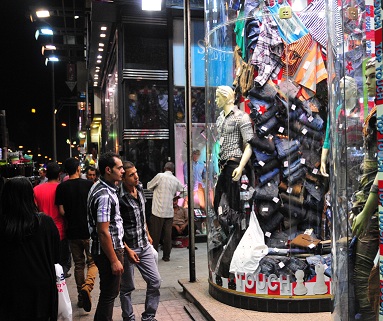Is there a curse hanging over Turkey? Each time the country achieves sustained development, something trips it up. This time it is the assassination on Friday of Hrant Dink, a newspaper editor, peacemaker and one of Turkey’s most prominent Armenians. Turkey is trying to rise to the challenge. Denunciations of the murder fill the airwaves, from the government to Islamic leaders to the army.
Thousands of Turks marched through the streets hours after the shooting, shouting, “We are all Armenians, we are all Hrant Dink. Turkey’s credibility as a future European Union member state is at stake. A man who confesses to pulling the trigger has been caught – a nationalist, by all accounts – but no murkiness must remain about the people and the thinking behind the killing.
Hrant Dink was not just left unprotected by the police. Bad laws, malevolent prosecutions and a growing nationalist hysteria created the lynch-mob atmosphere that transformed the sweet-mannered Dink into a public enemy number one. What killed Dink, in short, is the Turkish republic’s inability to deal with the Armenian issue – the charge that its predecessor state, the Ottoman Empire, killed 1.5 million Armenian men, women and children in a 1915 genocide. Official Turkey is still stuck in a rut of denial.
Efforts to open archives and to “leave it to the historians lead into dead ends, partly because of intransigence in the Armenian diaspora, but also partly because of Turkey’s anti-free speech laws – still extant in the form of Penal Code Article 301, with its catch-all penalties for “denigrating Turkishness. Discussing the great omissions in Turkey’s public education remains taboo. Even as moderate a politician as Foreign Minister Abdullah Gul angrily rejects that there is any room for a Turkish apology. That’s because the Turks have reasons to feel victimized themselves. Christian powers don’t apologize much for the ethnic cleansing carried out during the century until 1923, during which years they rolled back the borders of the Ottoman Empire. American historian Justin McCarthy estimates 5 million Muslims were killed. In 1915, World War I was raging.
Turkey was again under attack from Russia in the east and Britain and France in the west. The Armenian leadership openly sided with Turkey’s enemies, forming anti-Ottoman militias and demanding a state on Ottoman land. Turkey also fears that an apology would trigger claims on its land or on seized Armenian assets. Turks cannot believe the sincerity of foreign parliaments who, usually ill-informed about the Turkish case, give in to Armenian diaspora lobbying for genocide declarations.
One such bill looks more likely than ever to pass the United States Congress in April. Politics often seems to trump history. Would the French Parliament have made it a crime last year to deny the Armenian genocide if an unrelated desire to keep Turkey out of the EU had not been prevalent? Some maximal views of Turkish evil by Armenians were even criticized by Hrant Dink. He once wrote that diaspora Armenians should spend their energy supporting independent Armenia and not “let hatred of the Turks poison their blood. But Turkey has an attitude problem, too. Idiotically, it was the newspaper column mentioned above by Dink that caused him to be put on trial for violating Article 301, on the pretext that he had said that Turks were “poisonous. Why is it that, of all the Turkish authors charged with Article 301 offenses, only Dink actually received a jail sentence (six months, suspended)? Three years ago, Dink says he was told “something will happen to you if you continue by officials working for the same Istanbul governor who now smugly suggests the police win a prize for their swift apprehension of the assassin. (The governor’s office denies making any threat). Commentators are subtly shirking responsibility by labeling the murder a “provocation or blaming “outside forces. Many expressed pain since Armenians were a “trust under Turkey’s protection. It took one of Prime Minister Reccep Tayyip Erdogan’s advisers, Omer Celik, to point out that they were not guests and “were as much owners of this country as Turks are. Neither Turks not Armenians should go on like this. Erdogan- whose government was the first to grant Dink’s simple request for a Turkish passport – could try a grand gesture. The prime minister might open the border with Armenia, closed since the early 1990s.
He could advocate an international conference, where Turkey could argue its case that there was no centralized attempt to wipe out the Armenian race. After all, Turkey already officially accepts that 300,000 died. Recent years have also seen brave Turkish novels, films, exhibitions and academic conferences that addressed the gaping loss to Turkish society represented by the Armenian disappearance.
Best of all, Erdogan could abolish Article 301, which made all intellectuals like Dink a target. What debate can there be if Turkey drags anyone who deviates from the official line into court? None of this, however, is likely to happen. Turkey has presidential and parliamentary elections this year, and ultra-nationalists pose the main challenge to Erdogan’s centrist, pro-Islamic Justice and Development Party. Europe – whose support is critical in making a Turkish regime feel safe to reform – seems in no mood to extend lines of political credit to Turkey. So the gap between Turkey and Europe will widen again. Muddled thinking and inward-looking nationalism will continue to plague Turkey, and not only in its approach to the Armenian problem. After all, Dink’s murder is the symptom of negative currents that persist, not their cause. And that, of course, is why Turkey’s curse keeps returning to strike with such tragic ease.
Hugh Pope is an Istanbul-based journalist. His latest book is “Sons of the Conquerors: The Rise of the Turkic World (Overlook Duckworth 2005). This commentary was written for THE DAILY STAR.
